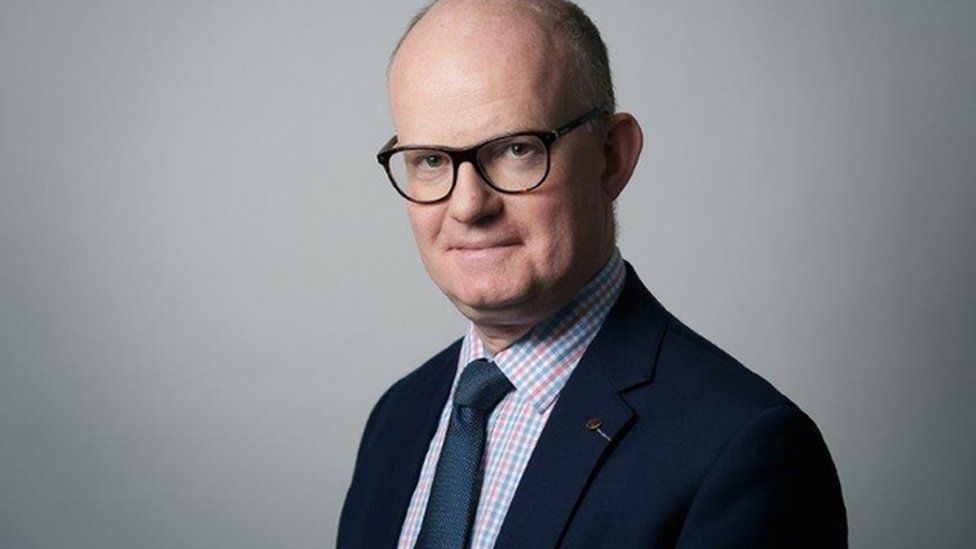Top prosecutor warns of enduring justice delays
- Published

An unprecedented backlog of cases awaiting trial is not going to be resolved any time soon, the outgoing director of public prosecutions warns.
Max Hill KC told the BBC the Crown Prosecution Service (CPS) staff were "hugely overburdened".
The service was struggling to find enough barristers to run cases in court, he said.
However, he urged victims of rape to have confidence in prosecutors because their cases were being prioritised.
Mr Hill's term, which ends this month but began in 2018, coincided with unprecedented challenges in criminal justice caused by a combination of pre-existing cuts, courts closed by the pandemic and criminal defence barristers later striking over government legal aid pay rates.
There is now a backlog of 65,000 trials in the crown courts - up from around 40,000 before the pandemic hit in 2020.
The CPS's preferred measure put the number higher at around 75,000 individual defendants.
The government wants to cut the backlog to 53,000 cases by March 2025 - but the picture has been worsening.
"We are at an all-time high. The backlog is not going to be removed next month, even next year. We have to all understand that," Mr Hill told the BBC in an exclusive broadcast interview.
"There are only so many courts. The judiciary is slightly expanded, but there are only so many people who are available for appointment as judges."
Too few barristers
The CPS's staffing has increased by a third to more than 7,300 since Mr Hill took over in 2018. However, that is still below the high of 8,000 in 2010.
Mr Hill said there were also too few criminal barristers - who work independently of the CPS - to present cases to judges and juries once a trial was ready for court.
He said: "The CPS at the moment is struggling day-on-day, week-on-week to find sufficient external barristers who are physically available to prosecute our cases. That is a matter of concern."
"It's not as though we've got people in the office who we can suddenly send to court. All of our own advocates are fully deployed in court. We can't go on having cases listed where there is no prosecution advocate available.
"I have spent five years going around all of our offices talking to all of our staff, looking at how much pressure they are under.
"They are hugely overburdened - the number of individual live cases on a prosecutor's laptop today is far greater than I would like it to be."
The Ministry of Justice says that courts are operating at full throttle.
Ministers have abolished a cap on how many days judges are paid - meaning that Crown Courts sat for more than 100,000 days last year, the highest level since 2018.
Last year, it finally settled the protracted dispute with barristers over pay for defence cases - hoping that a major increase would entice lawyers back to criminal work.
Prioritising serious cases
Mr Hill said that a key route to reduce the backlog was agreeing with both the courts and defence lawyers which defendants could be quickly dealt with first - including those on remand in jails or willing to plead guilty and be sentenced.
But the CPS is now also trying to prioritise the most serious cases amid no signs of the backlog immediately easing.
"I've waited to see whether there was a system-wide solution... of reducing [the] backlog by a certain percentage year-on-year or even month-on-month.
"I think that that is simply not possible. So the alternative is what we have to move to now, which is to say, of the charged cases, these are the ones which will have higher priority going forward.
"For me that starts with custody cases pre-trial, it then must go to adult rape cases. And if I was here longer, I would have a lot to say about the higher-end higher seriousness domestic abuse cases, which is a major component of our caseload, which I think needs priority."
He added: "I don't think there is an overarching solution to the backlog that will resolve it in a few months or even a year's time."
Rape prosecution progress
There are more than 2,300 rape cases awaiting trial - four times higher than on the eve of the pandemic. The average time from offence through to outcome is now three and a half years.
Critics say too few cases are being referred to the CPS. The government says that rate is now climbing. The CPS in turn has almost doubled the number of rape cases it sends to court each quarter - up from 540 in 2021 to 940 now.
He said he believed the recent nationwide roll-out of "Operation Soteria", a new way of investigating rape to try to maintain the confidence of victims, was key to improvements.
"All of the work that we've put in over three years now to try to address... woefully low number of rape cases in the system, will be frittered away if we can't bring those cases to trial and give people their day in court," he said.
"I wouldn't blame any victim of rape, for saying, I can only wait so long, I can only put my life on hold for so long.
"That is why, alongside pre-trial custody cases, I put adult rape at the very top of what I think must be prioritised, because it is damaging for individuals."
A Ministry of Justice spokesperson said: "We recognise the devastating impact of rape and are doing more than ever before to ensure victims feel supported at all stages of the criminal justice process.
"This includes quadrupling funding for specialist support services compared to 2010, announcing new legislation to ensure rapists spend their entire sentence behind bars and a new 24/7 support line for victims of rape and sexual abuse and the national rollout of pre-recorded cross-examination."
Related Topics
- Published9 February 2023